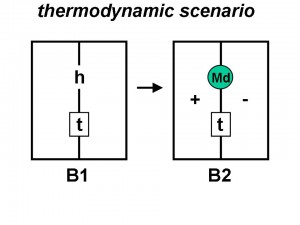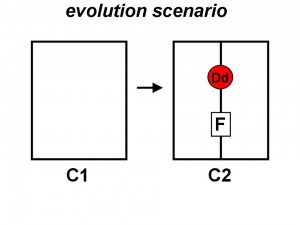There are many perspectives and arguments showing the absurdity of Darwinism. One of them consists in analyzing the so-called Darwin’s demon. Here I don’t mean the devil suggesting to Charles Darwin that God was non necessary because evolution created the beings. To know what I mean with “Darwin’s demon” we have to compare a thermodynamic scenario and a biological scenario. Let’s start with the former:
A box B1 containing gas molecules is divided in two zones by a central wall. A zone is filled with gas and the other is void. If in this wall we create a hole h the gas diffuses in both zones. The hole doesn’t increase the degree of organization of the gas molecules, which paths are entirely random. We can express this with O(h)=0, O(randomness)=0. In these conditions, if a turbine, or something like that, is installed into the wall, the turbine doesn’t run (left and right zones have the same pressure).
A box B2 is identical to B1 but instead of the hole there is a so-called Maxwell’s demon Md. Md is an “intelligent organizer” controlling the hole as a gate. It controls the molecules: if it sees a molecule directed from the right zone to the left zone then Md opens and lets the molecules pass; if it sees a molecule directed from the left zone to the right zone then Md closes. This way a pressure difference is again created between left (+) and right (-), and the turbine runs. Md produces organization and work: O(Md) > 0. Md provides the control, the molecules provide the power. Control + power give organization. See my previous post on this topic.
Now consider a similar biological scenario of Darwinian evolution:
A system capable of self replication (self-replicator) C1 contains organic molecules and has O(C1) degree of organization. According to the definition of Darwinian evolution, C1 evolves (increase in organization) by means of random variations inside itself. This is illustrated in the self-replicator C2, which has in the middle an equivalent of a Maxwell’s demon. For this reason, let’s call this equivalent “Darwin’s demon” Dd. Eventually if Dd succeeds, a new organized function F arises (F is somehow equivalent to the above turbine). The Dd’s successful job can be written:
O(C2) > O(C1).
Darwin’s demon impotency
If we compare the two scenarios we could think they are equivalent. But we would be wrong. While Md is an “intelligent organizer”, Dd is an “unintelligent non organizer”. In fact, according to the definition of evolution, Dd is unguided unintelligent “random variations”, i.e. pure randomness. We have seen before that O(randomness)=0, then O(Dd)=0. Therefore a Dd is incapable to increase organization in a replicator. So the C2 situation is not similar to B2, rather to B1. In brief, a Dd is like the hole in B1. Like a turbine doesn’t run in B1, a new function F cannot arise in C2.
This observation has consequences:
(a) Darwinian evolution (or any unguided unintelligent evolution), aka random increase of organization, is thermodynamically absurd. “Random organization” is an oxymoron.
(b) To deny that, as evolutionists do, means to claim – in the above thermodynamic scenario – that a random Md, i.e. a hole, is capable to increase organization and produce work. This means to refute the thermodynamics laws, and believe that a perpetual motion machine can exist.
Possible objections from evolutionists
Objection 1. Evolution is random variations + natural selection. Natural selection (NS) selects the more organized replicators in a population and this makes evolution work.
Answer. No. NS is a post-processor. NS takes replicators as input. If no replicator is more organized than the others (as the above argument shows), NS cannot output the more organized replicator. In informatics jargon this is the GIGO principle: garbage in, garbage out. As most evolutionists rightly say, the true engine of evolution is chance. If chance inputs garbage into NS, NS is fully impotent, and in turn outputs garbage.
Objection 2. Differently from a box of gas, a replicator contains instructions, and random variations on these instructions could create organization.
Answer. No at all. To reason in terms of instructions instead of molecules changes nothing. In fact, for both molecules, instructions or whatever, the disorganized states are always far more numerous than the organized states. Given the former are more numerous than the latter, the former are far more probable, and this causes all systems always tend in both cases (molecules and instructions) toward disorganization. (This is the meaning of the 2nd law, or entropy’s law, in its statistical mechanics sense.) A selfreplicator, or any system processing information, is not exception, because the 2nd law applies to all systems.
Objection 3. A Maxwell’s demon cannot exist, thus the conclusion “a” about the absurdity of evolution is wrong.
Answer. Non sequitur. A gratis Maxwell’s demon contra the thermodynamics laws cannot exist in principle. But a “no free lunch” computerized Maxwell’s demon consuming energy and respectful of the thermodynamics laws, is thinkable. Therefore my argument about the two scenarios (thermodynamics, biology) and the conclusion about the absurdity of evolution are ok.
Objection 4. The job of a Darwin’s demon is different from the job of a Maxwell’s demon then the argument is flawed.
Answer. Indeed the opposite. The different jobs reinforces the argument, because Dd’s job is far more complex than Md’s. In fact while Md has to control only the direction of the molecules, Dd has to control a series of qualitative properties of the molecules to decide if they are useful to increase organization. If a random/hole Md is incapable to do its easy job, to greater reason a random/hole Dd is incapable to do its difficult job.
Bottom line: while a Maxwell’s demon represents intelligence, Darwin’s demon represents chance, aka ignorance. While the former works in principle, the impotency of the latter symbolically represents the nonsense of Darwinism.

